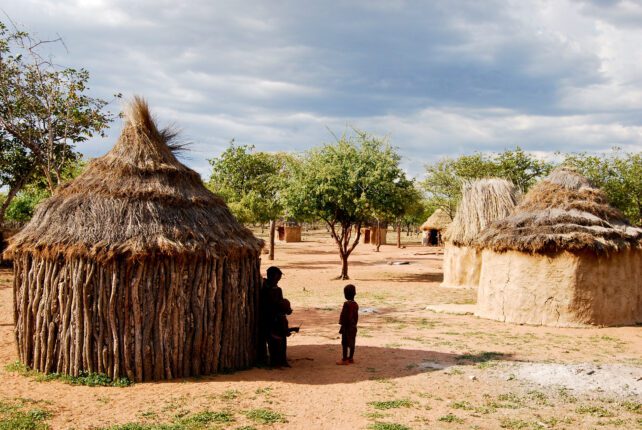-
Somalia’s New Climate Roadmap as a Blueprint for Peace

Somalia’s new Nationally Determined Contribution (NDC)—the country’s roadmap for climate mitigation and adaptation—does more than outline the country’s climate ambitions. It recognizes the connections between climate change and conflict and charts a course for peace.
For more than 30 years, Somali people have grappled with violent conflict and fragmented governance. Tensions stemming from power-sharing disagreements and the influence of Al-Shabab and other armed groups have led to conflicts that have displaced millions of people and created barriers to humanitarian assistance.
Somalia is also among the seven countries most vulnerable to climate change, due in part to its geography, but also because it lacks the resources and institutions to adapt effectively. Drought and floods undermine livelihoods, escalate competition for natural resources, and fuel tensions between communities. Paired with decades of violent conflict the climate pressures on natural resources have created a feedback loop.
Going Beyond “Do No Harm” to Protect the Most Vulnerable
Somalia’s third NDC report breaks new ground by recognizing that climate action and peacebuilding must go hand in hand. Intentional climate action can foster trust through collaboration and help to reduce conflict, and peacebuilding can contribute to climate resilience by enabling joint decision-making about the future.
The roadmap recognizes the interconnectedness of peace and climate resilience by calling for “conflict-sensitive approaches across planning, implementation, and monitoring,” especially in agriculture and water management. Notably, the report highlights the importance of including vulnerable groups such as displaced people, women, youth and persons with disabilities—recognizing the need for inclusive and equitable measures that meet their specific needs.
The climate roadmap goes beyond simply aiming to “do no harm” by positioning climate action as an opportunity for peacebuilding and stabilisation. It outlines how climate interventions can deliver multiple benefits for social cohesion, for example, through collaborative natural resource management or by supporting community-based systems for land, water, and resource dispute resolution.
The NDC also aligns climate security and peacebuilding with other national policies, including the National Transformation Plan (2025-2029) and the Integrated Water Resource Management Strategic Plan.
How Climate Action Supports Peacebuilding and Stabilization
SIPRI research in Somalia highlights examples of how to advance the new NDC’s ambition to support climate action and social cohesion in tandem. Climate impacts have made water and grazing land scarcer in Somalia. In pastoralist regions, this scarcity often fuels conflict among pastoralists. But climate initiatives that strengthen natural resource management—for example by training local, even informal, committees on sustainable environmental practices—can provide spaces for dialogue and support a peaceful coexistence.
The same is true for energy. Firewood and charcoal are key energy sources for Somali communities, but they also drive deforestation and land degradation. Tensions can flare between those who depend on charcoal for income and those who need shade trees to grow crops. Locally-managed, low-cost solar hubs can offer a cleaner and more affordable alternative.
Climate action can also foster trust and enable collaboration among groups in conflict. That’s vital in Somalia, where decades of conflict have eroded relationships within and between communities. The International Organisation for Migration’s co-funding mechanism requires communities to jointly identify, design and fund shared priorities. In Galmudug, this approach led to co-financed water infrastructure projects that provided critical access to water and helped families displaced by record-breaking drought return home.
Climate initiatives can also strengthen governance—another pillar of stability. In Somalia, government services are often weak or absent, especially in areas recovered from the control of non-state armed groups. But when district councils, supported by climate investments, provide tangible services, like access to water and clean energy, they build credibility. And when local authorities have limited resources or technical knowledge, partnerships with local businesses can help fill the gap and deliver services that make communities stronger in the face of climate change.
Building Trust Among Neighbors Helps Communities Adapt to Climate Change
The relationship goes both ways. Peacebuilding can also help communities adapt to climate change.
In Somalia, conflict has disrupted land and water access and eroded traditional management systems. Mistrust among communities makes it harder to coordinate adaptation efforts—especially those that require collaboration or shared labor.
Peacebuilding can relieve some of this pressure. It allows communities the “breathing room” to think long-term, to plan, and to adapt their livelihoods. It also strengthens the social bonds needed to sustain adaptation. Trust and social capital (networks and norms that facilitate cooperation) are crucial for climate adaptation. They allow people to pool resources, share knowledge and decide on projects that make communities more resilient. Regenerative agriculture, for example, is relatively low-cost but labor-intensive. It works best when people work together. In doing so, it not only improves soil health but also builds trust and cohesion among neighbors.
A Country Roadmap with Global Implications
Somalia’s third NDC is a significant step forward in connecting climate action and peacebuilding, but implementing the NDC means balancing immediate human needs and long-term sustainability. Somalia has high levels of food insecurity and violence, and millions of people are still living in protracted displacement. Balancing the urgency of these needs with a long-term vision for climate adaptation and peacebuilding is a significant challenge. Additionally, short project timelines make it harder to plan, support and assess integrated climate and peace initiatives over time.
The takeaway is clear, however: investing in climate action in conflict-affected states is part of the route to peace and stability. To help Somalia achieve its immediate and long-term goals, international donors, partners and organizations working in the country need to ensure that their climate and peace efforts are tightly aligned. This means championing sustained community-led initiatives that deliver both environmental benefits and peace dividends, supported by longer-term planning and comprehensive assessments.
Ann-Sophie Böhle served as a Research and Project Assistant at SIPRI, contributing to publications on climate action and its role in environmental peacebuilding.
Kheira Tarif is a researcher in the SIPRI Climate Change and Risk Programme.
Photo Credit: Licensed by Adobe Stock.
Sources: Ministry of Environment and Climate Change of Somalia, Notre Dame Global Adaptation Initiative, Stockholm International Peace Research Institute, United Nations Office for the Coordination of Human Affairs.
Topics: adaptation, agriculture, climate change, CO2, development, environment, environmental security, land, meta
 A Publication of the Stimson Center.
A Publication of the Stimson Center.








